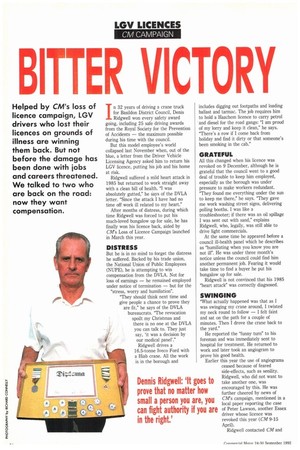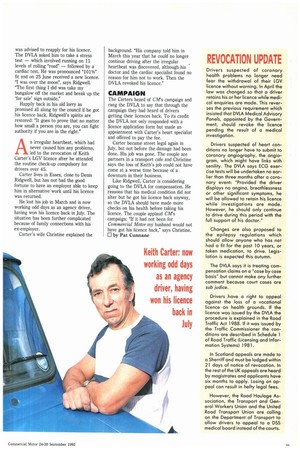BITTER VICTORY
Page 36

Page 37

If you've noticed an error in this article please click here to report it so we can fix it.
Helped by CM's loss of licence campaign, LGV drivers who lost their licences on grounds of illness are winning them back. But not before the damage has been done with jobs and careers threatened. We talked to two who are back on the road: now they want compensation. In 32 years of driving a crane truck for Basildon District Council, Denis Ridgwell won every safety award going, including 25 safe driving awards from the Royal Society for the Prevention of Accidents — the maximum possible during his time with the council.
But this model employee's world collapsed last November when, out of the blue, a letter from the Driver Vehicle Licensing Agency asked him to return his LGV licence, putting his job and his home at risk.
Ridgwell suffered a mild heart attack in 1985 but returned to work straight away with a clean bill of health. "I was absolutely gutted," he days of the DVLA letter. "Since the attack I have had no time off work ill related to my heart."
After months of distress, during which time Ridgwell was forced to put his much-loved bungalow up for sale, he has finally won his licence back, aided by CM's Loss of Licence Campaign launched in March this year.
DISTRESS
But he is in no mind to forget the distress he suffered. Backed by his trade union, the National Union of Public Employees (NUPE), he is attempting to win compensation from the DVLA. Not for loss of earnings — he remained employed under notice of termination — but for the "stress, worry and humiliation".
"They should think next time and give people a chance to prove they are fit," he says of the DVLA bureaucrats. "The revocation spoilt my Christmas and there is no one at the DVLA you can talk to. They just say, 'it was a decision by our medical panel'." Ridgwell drives a 16.5-tonne Iveco Ford with a Hiab crane. All the work is in the borough and includes digging out footpaths and loading ballast and tarmac. The job requires him to hold a Hazchem licence to carry petrol • and diesel for the road gangs: "I am proud of my lorry and keep it clean," he says. "There's a row if I come back from holiday and find it dirty or that someone's been smoking in the cab."
GRATEFUL
All this changed when his licence was revoked on 9 December, although he is grateful that the council went to a good deal of trouble to keep him employed, especially as the borough was under pressure to make workers redundant. "They found me everything under the sun to keep me there," he says. "They gave me work washing street signs, delivering polling booths. I was like a troubleshooter; if there was an oil spillage I was sent out with sand," explains Ridgwell, who, legally, was still able to drive light commercials.
At the same time he appeared before a council ill-health panel which he describes as "humiliating when you know you are not ill". He was under three month's notice unless the council could find him another permanent job. Fearing it would take time to find a buyer he put his bungalow up for sale.
Ridgwell is not convinced that his 1985 "heart attack" was correctly diagnosed.
SWINGING
"What actually happened was that as I was swinging my crane around, I twisted my neck round to follow — I felt faint and sat on the path for a couple of minutes. Then I drove the crane back to the yard."
He reported the "funny turn" to his foreman and was immediately sent to hospital for treatment. He returned to work and later took an angiogram to prove his good health.
Earlier this year the use of angiograms ceased because of feared side-effects, such as senility. Ridgwell, who did not want to take another one, was encouraged by this. He was further cheered by news of CM's campaign, mentioned in a local paper reporting the case of Peter Lawson, another Essex driver whose licence was revoked this year (CM 9-15 April).
Ridgwell contacted CM and was advised to reapply for his licence. The DVLA asked him to take a stress test — which involved running on 11 levels of rolling "road" — followed by a cardiac test. He was pronounced "101%" it and on 25 June received a new licence. "I was over the moon", says Ridgwell. "The first thing I did was take my bungalow off the market and break up the 'for sale' sign outside."
Happily back in his old lorry as promised all along by the council if he got his licence back, Ridgwell's spirits are restored: "It goes to prove that no matter how small a person you are, you can fight authority if you are in the right."
An irregular heartbeat, which had never caused him any problems, led to the revocation of Keith Carter's LGV licence after he attended the routine check-up compulsory for drivers over 45.
Carter lives in Essex, close to Denis Ridgwell, but has not had the good fortune to have an employer able to keep him in alternative work until his licence was returned.
He lost his job in March and is now working odd days as an agency driver, having won his licence back in July. The situation has been further complicated because of family connections with his ex-employer.
Carter's wife Christine explained the background. "His company told him in March this year that he could no longer continue driving after the irregular heartbeat was discovered, although his doctor and the cardiac specialist found no reason for him not to work. Then the DVLA revoked his licence."
CAMPAIGN
The Carters heard of CM's campaign and rang the DVLA to say that through the campaign they had heard of drivers getting their licences back. To its credit the DVLA not only responded with a licence application form but made an appointment with Carter's heart specialist and offered to pay the fee.
Carter became street legal again in July, but not before the damage had been done. His job was gone. The couple are partners in a transport cafe and Christine says the loss of Keith's job could not have come at a worse time because of a downturn in their business.
Like Ridgwell, Carter is considering going to the DVLA for compensation. He reasons that his medical condition did not alter but he got his licence back anyway, so the DVLA should have made more checks on his health before taking his licence. The couple applaud CM's campaign: "If it had not been for Commercial Motor my husband would not have got his licence back," says Christine. ID by Pat Cunnane








































































